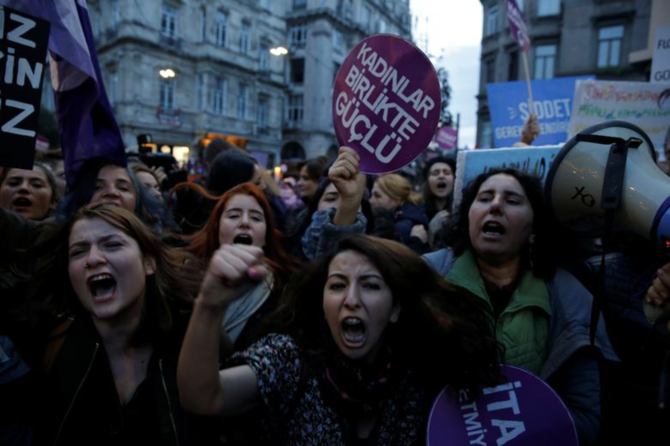
- ARAB NEWS
- 05 Jul 2025

In 1934, Turkish women became among the first in Europe to gain the right to enter politics. Since then, women have been active in national politics. However, they still strive to find equality in the political realm.
Although, rhetorically, all the parties in Turkey adopt a welcoming and encouraging stance on women’s involvement in politics, in reality it remains a male-dominated arena. For instance, despite women being in politics since the establishment of the republic, Tansu Ciller remains Turkey’s first and only female prime minister after she served between 1993 and 1996. Since then, all the presidents and prime ministers have been male.
Despite this fact, the male-dominated and led political parties still have to knock on women’s doors when it comes to chasing their support in elections. Turkish political parties, which have their own women’s branches that are connected to their headquarters, have recently ramped up their efforts to gain female support ahead of the critical elections scheduled for 2023. In addition to the votes of the youth and the Kurds, the women’s vote will be highly important in determining the outcome.
In a homemade video, the main opposition CHP leader Kemal Kilicdaroglu this week announced his party’s six-step plan for women in Turkey, which it would implement within six months if it is victorious. He also underlined that the CHP would re-enforce the Istanbul Convention on combating and preventing violence against women within the first week of taking power, should his alliance with Meral Aksener, the leader of the center-right IYI, form a government.
Aksener’s defense of women’s rights has significantly increased her popularity in recent polls. Aksener, who was Turkey’s first female interior minister, took prompt action this week and fired one of her party’s deputies due to his macho and insulting words to a voter who protested her at a rally.
Another politically significant name, Istanbul Mayor Ekrem Imamoglu, one of President Recep Tayyip Erdogan’s main rivals, has been critical of the government’s policy on women. He had previously condemned the ruling AKP party for withdrawing from the Istanbul Convention in the middle of the night, saying the move “trampled on the struggle women have led for years.”
There is a significant presence of women in the opposition ranks, while the AKP is also trying to shore up support among conservative women voters. For a decade, the ruling party has enjoyed support among women, largely due to its 2011 reversal of the headscarf ban that kept many women out of university.
In addition to the youth and the Kurds, the support of women will be highly important in the outcome of the 2023 elections.
Sinem Cengiz
However, the AKP’s headscarf accomplishment would not have been possible without the achievements of the feminist movement in Turkey. The support of secular and liberal women in the fight over the headscarf issue should be noted. Now the same women expect similar support from conservative AKP supporters when it comes to women’s rights.
Withdrawing from the Istanbul Convention caused a backlash not only from the secular segments of society, but also conservative ones. Women’s rights activists, lawyers and opposition politicians denounced Erdogan’s March decision, pouring on to the streets to protest for days because, for many women, the scrapping of the convention was a huge disappointment. Erdogan, who was the first leader to sign the convention, seemed to withdraw from it in the face of pressure from some conservatives, whose votes he is keen to garner.
Over the past few years, there have also been some statements on women made by AKP officials that caused disappointment. Statements such as women should not laugh in public, or that they should dress modestly, indicate a selective conservatism regulating the role of women in the public space.
Although the AKP has a significant number of female MPs, it is believed by many that these female politicians only help to strengthen the patriarchy, rather than force the government to improve conditions for women in Turkey. The most recent example was when a female AKP deputy said that “women had no name” before the AKP came to power, prompting outrage from the opposition.
Kilicdaroglu’s announcement shows that the CHP’s plan for women is a well-prepared one, while one particular photograph from the Istanbul Marathon, which took place on Sunday, was a clear indication that the party is going to have significant female support in the elections. In addition to Aksener, the presence of Canan Kaftancioglu, the CHP’s chairwoman for Istanbul, Aylin Nazliaka, deputy chairwoman of the CHP’s women’s branch, and Dilek Imamoglu, the wife of the Istanbul mayor, grabbed the attention of many. In the photo, there were more women than men and the prominence of these women was notable.
The AKP now needs the support of its base of conservative women more than ever, because losing their vote would indicate a major political stumble for the party, which owes much of its success to these women. It might even need to win back the hearts of the women who supported the party in its early years.
In a nutshell, one of the increasingly polarizing issues in Turkey is women’s rights, including their role and participation in political and public life. It is also crystal clear that, without women’s support, no party will be able to fulfill all their goals in the 2023 vote. However, it is crucial that they should not be used as a tool for political gain and parties should be genuine in their “win with women” policies in order to improve the conditions for women in Turkey.